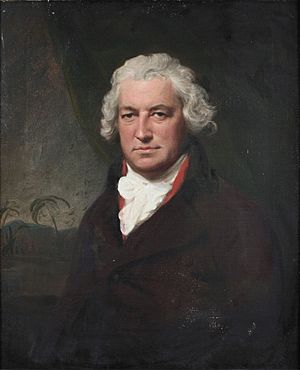Bryan Edwards (politician) facts for kids
Quick facts for kids
Bryan Edwards
FRS
|
|
|---|---|

Portrait by Lemuel Francis Abbott
|
|
| Member of Parliament for Grampound |
|
| In office 28 May 1796 – 16 July 1800 |
|
| Preceded by | Thomas Wallace, 1st Baron Wallace |
| Succeeded by | Sir Christopher Hawkins, 1st Baronet |
| Personal details | |
| Born | 21 May 1743 Westbury, Wiltshire |
| Died | 16 July 1800 (aged 57) Southampton |
| Nationality | British |
| Spouse | Martha Phipps |
| Parents |
|
Bryan Edwards (born May 21, 1743 – died July 16, 1800) was an English politician and historian. He was born in Westbury, Wiltshire. Edwards was known for supporting the slave trade. William Wilberforce, a famous person who fought to end slavery, called Edwards a strong opponent of his cause.
Contents
Bryan Edwards' Family Life
Bryan Edwards was the oldest son of Bryan Edwards (who died in 1756) and Elizabeth Bayly. Elizabeth was the sister of Zachary Bayly, a wealthy plantation owner in Jamaica.
After his father passed away, Bryan Edwards was first helped by another uncle, Nathaniel Bayly. However, they later had a disagreement. So, Zachary Bayly took over caring for Bryan and making sure he got an education. Around 1759, Bryan joined Zachary in Jamaica. Zachary hired a private teacher to finish Bryan's schooling.
When Zachary Bayly died, Bryan Edwards inherited his large fortune. This included six plantations in Jamaica. In 1773, he also inherited money from another person living in Jamaica named Hume.
Edwards married Martha Phipps. They had one son who survived, named Zacchary Hume Edwards, and a daughter. When Bryan Edwards died in Southampton in 1800, he left most of his property to his son.
Bryan Edwards' Career and Work
Edwards' Political Journey
Bryan Edwards became an important member of the local government in Jamaica. After some years, he returned to England.
In 1782, Edwards tried to become a member of Parliament for Chichester, but he did not win. He went back to Jamaica from 1787 to 1792. Then, he settled in England as a merchant who traded with the West Indies. He tried again to enter Parliament in 1795 for Southampton, but he failed once more.
Finally, on May 28, 1796, he became a Member of Parliament for Grampound. This was a small town in Cornwall known for its corrupt elections. He served alongside Robert Sewell, another politician who supported slavery and had business in Jamaica. Edwards remained in this position until he died.
Edwards' Writings and Books
Bryan Edwards was also a writer. In 1784, he wrote a book called Thoughts on the late Proceedings of Government respecting the Trade of the West India Islands with the United States of America. In this book, he criticized the government for limiting trade with the United States.
In 1793, he published a two-volume work titled History, Civil and Commercial, of the British Colonies in the West Indies. Later, in 1797, he released Historical Survey of the French Colony in the Island of St Domingo. These two books were later combined and republished as History of the British Colonies in the West Indies in three volumes. This important work was translated into German, and parts of it were also translated into French and Spanish. A fifth edition was printed in 1819.
When the explorer Mungo Park returned in 1796 from his famous trip in Africa, Edwards helped write an account of Park's travels. Edwards was the secretary for a group called the Association for Promoting the Discovery of the Interior Parts of Africa. This group published the account in their official Proceedings. When Mungo Park later wrote his own book about his journeys, he used Edwards' help.
Edwards also wrote some poems and other works about the history of the West Indies.
Awards and Recognition
Bryan Edwards was recognized for his work and knowledge. He was chosen as a member of the American Philosophical Society in 1774. In 1794, he became a Fellow of the Royal Society, which is a very respected group for scientists.
 | Audre Lorde |
 | John Berry Meachum |
 | Ferdinand Lee Barnett |

